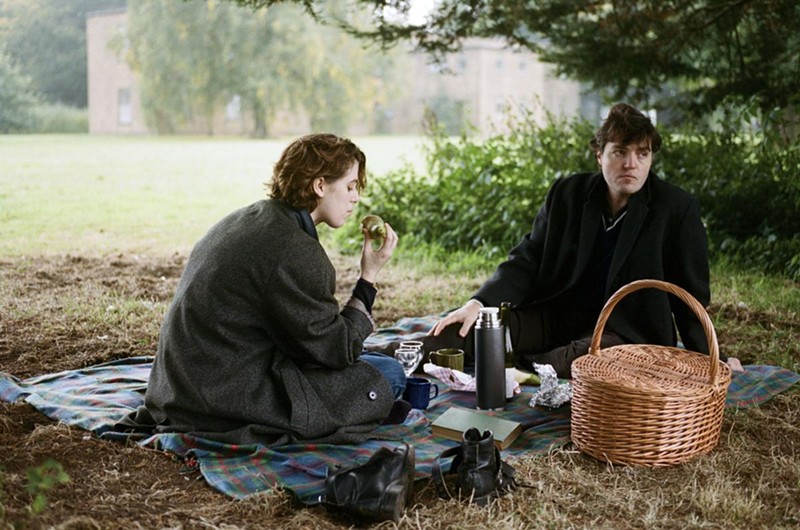Review: 'The Souvenir' looks at a past love with 20/20 vision
[
{
"name": "GPT - Leaderboard - Inline - Content",
"component": "35519556",
"insertPoint": "5th",
"startingPoint": "3",
"requiredCountToDisplay": "3",
"maxInsertions": 100
}
]
Most movies about young people make some showcase of their characters discovering their own exceptionalism, their narrative structure revolving around their being anointed as special and unique. The implication is almost religious in its suggested faith; it’s that all is within reach, that if we (for we're typically invited to identify with these leads) all just trusted ourselves more or made the right call at the right moment, we’d find ourselves rewarded with brilliant careers, or the perfect romantic partner. Barring the brief, dark passages that may be depicted onscreen (usually a climactic night or a week involving some momentary embarrassments), we can basically expect life to go our way. Greatness shall be, or should have been — if these stories are to be believed — our birthright.
The Souvenir, the fourth and latest feature from Joanna Hogg, is markedly different. Instead of suggesting that its lead actors will outstrip us all by coming into themselves and outgrowing hardship, it asserts simply that they are whole people. In casting Honor Swinton Byrne as Julie (her mother Tilda also appears) and Tom Burke as Anthony, our two principals and romantic partners, Hogg’s found actors who convincingly go about the world their own way. Whether together or apart, the pair less dresses or looks period-hip (the setting is England in the early 1980s) than they, being artistically minded, thoughtfully pastiche or evoke various and often prior times. Anthony, with his hooded eyes, pale complexion, and default near-pout, clings to an officer’s coat like a security blanket (he works in the Foreign Service) and never dresses down, adopting an unadorned prickliness that should be beyond reach at his age.
As with Burke, Byrne’s costuming (all by Grace Snell) is remarkable, shifting from shaggy elegance to more primly presented but well-tuned expressions of Julie's tastes, changing as convincingly as her interests and moods. Her aura is graceful and reserved but unselfconscious; she tries things out as often as she likes to (just as she does in film school), a symptom of her curiosity and uncertainty at 24. Together the two actors play off each other in ways that feel unshowy in a rare way: their rapport feels private and personal, uncertain in nature — and marked by evident and ardent need. If there’s an overplayed music cue or a tearful scene in the rain in the final cut then I must have struck it from my memory, replacing it with scenes of the two borrowing money for fine meals, lying around Byrne’s apartment and talking through her work, or lingering over breakfast in her kitchen.
Julie’s apartment — like the gilded dining room they often eat in — feels very much a character. Hogg’s attention to architecture has always been precise and rather formal, and here she embeds her characters in doorways, staircases, or sprawling rooms in a way that feels more graceful and smoothly integrated than before, often recalling early Woody Allen. Patterns of repeating compositions spackle what could be a discontinuous timeline together (the same staircase, the same table in front of a mirror, the same place at a go-to restaurant) until the emotional dissonance between the scenes they’re found in becomes a deeply felt disturbance. Such disturbances — of spaces, psyches, “arcs,” and lives — are less the film’s heart than its locus of empathetic concern. Hogg’s vision is broad and knowledgeable, but The Souvenir’s heart is unquestionably Julie’s.
It’s near-impossible to watch a young person age onscreen without the story becoming a narrative coming-of-age or a comment on the same. That’s not nailed in here, but it’s an inescapable element, just as it’s an inevitable, going question whether the film’s key relationship serves as a step in Julie’s personal development or an interruption in her growth. A question because it’s intrinsically ambiguous, and because Hogg grasps (even as she shows Julie learning and changing) that other people don’t exist to serve our own personal awakenings, our journeys or our “arcs.” They are not for us — they merely are.
As Anthony enters Julie’s life, he brings a host of troubles with him, most notably a substance problem which the movie treats — like Julie’s often naive responses — with patience and respectful concern. Hogg, declining to ever show him using, has us witness only those effects Julie experiences in her own life (the film never veers from her to follow Anthony on his own). In doing this, in telling a story so deliberately confined, Hogg unforcefully hones its perspective, focusing her gaze on the trickier stuff of living around addiction or in a relationship, dodging the often simplistic and high dramatics that so often accompany depictions of the two. The air of mystery — regarding what we are or mean to each other, of what could be done or might be best to build a future — is carefully preserved, and those who see The Souvenir are lucky viewers for it. It’s what animates any romance, struggle, or day spent living. Stay on top of Detroit news and views. Sign up for our weekly issue newsletter delivered each Wednesday.






